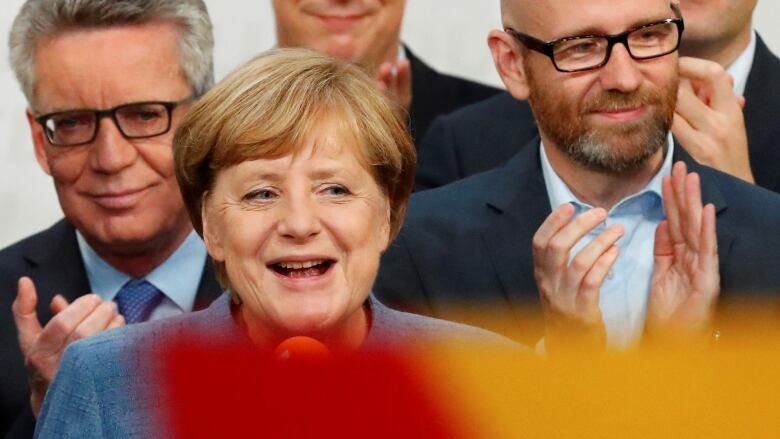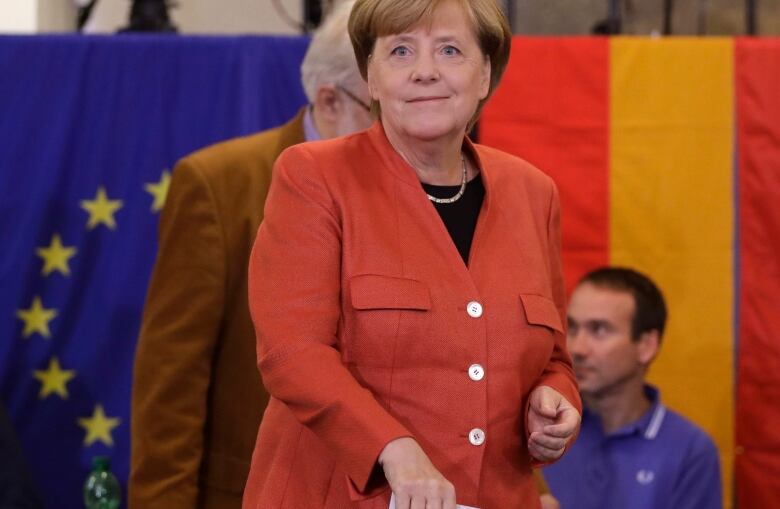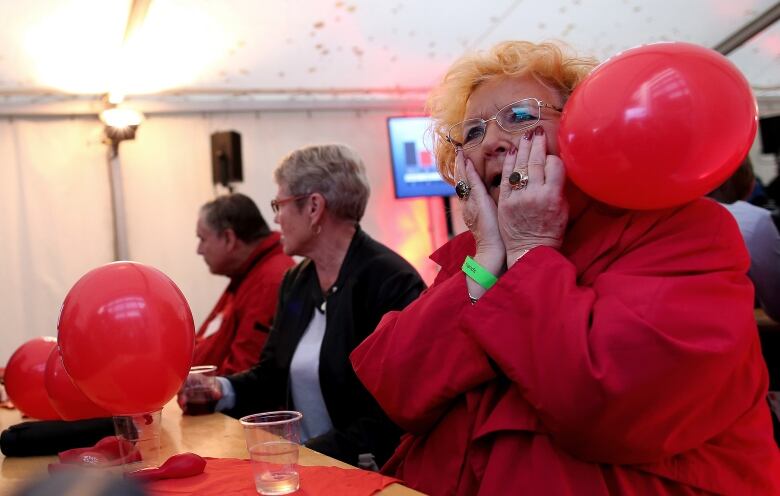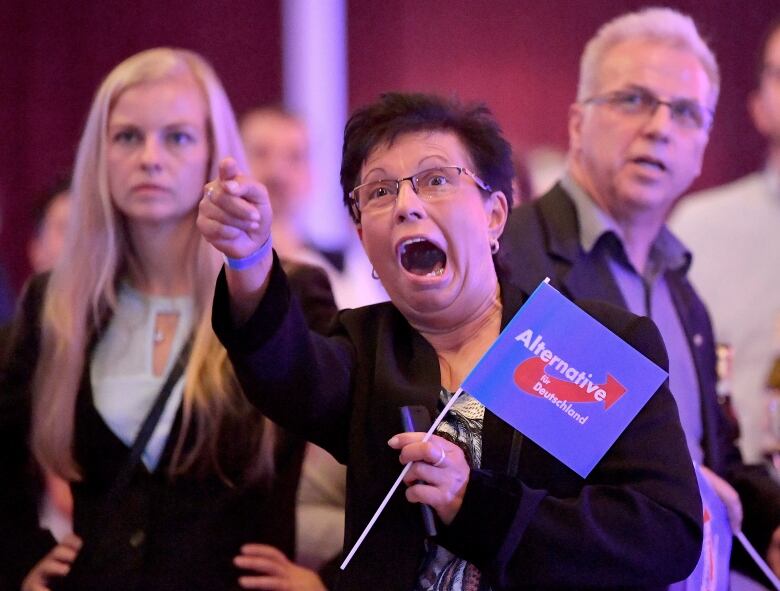Merkel hangs on to power in Germany but bleeds support to surging far right
Anti-immigrant Alternative for Germany party entering parliament for 1st time

German Chancellor Angela Merkelwon a fourth term in office on Sunday but Europe's most powerfulleader will have to govern with a far less stable coalition in afractured parliament after her conservatives hemorrhagedsupport to a surging far right.
Two years after Merkel left German borders open to more than1 million migrants, the anti-immigration Alternative for Germany(AfD) stunned the establishment by becoming the first far-rightparty to enter parliament in more than half a century.
- ANALYSIS |Merkelamong 'last defenders' of liberal world order
- ANALYSIS |Merkelfinds perfect tag team partner in Macron
- Merkelpitches German voters steady course while far right makes waves
The AfD won 13.0 percent of the vote more than expectedand one of many shocks on a night of drama that saw Merkel'sconservatives get their worst result since 1949, and her mainSocial Democrat (SPD) rivals their worst since 1933.
Describing the far right's success as a test for Germans,Merkel insisted she had a mandate to govern a formidable challenge as she has little choice but to cobble together athree-way coalition with a pro-business group and the Greens.
'We are the strongest party'
"Of course we had hoped for a slightly better result," a humbled Merkel said after her conservative bloc slumped to 32.9 per cent of the vote down from 41.5 per cent at the last election in 2013.
But she added: "We are the strongest party, we have themandate to build the next government and there cannot be a coalition government built against us."

The euro slipped around 0.4 per cent in early Asiantrading as it became clear the results would make forming a coalition tricky forMerkel.
Coalition building could take months as Merkel's onlystraightforward path to a majority in parliament would be athree-way tie-up with the liberal Free Democrats (FDP) and theGreens an arrangement untested at national level.
End of 'grand coalition'
The Social Democrats, who have served with Merkel'sconservatives as junior partners in a "grand coalition" for thepast four years, won just 20.6 per cent of the vote, as nearlyhalf of voters repudiated the two parties that have dominatedGermany since World War Two.
SPD leader Martin Schulz said the party would refuse to rejoin a coalition and instead take up its position as the main opposition. The Social Democrats appear to have been hurt badly by being in government, making it difficult to distinguish themselves from Merkel's conservatives.

After shock election results last year, from Britain's vote to leave the EU to the election of U.S. President Donald Trump, leaders of Europe's establishment have looked to Merkel to rally the liberal Western order.
A pastor's daughter who grew up in Communist East Germany,she has acted as an anchor of stability in Europe and beyond.
Now, she faces an unstable situation at home as she must form acoalition, an arduous process that could take months.
'Tectonic shift'
Sunday's election, fought against the tense backdrop ofsurging support for far left and far right parties across Europe, delivered a fractured German parliament with six partygroups, up from four previously.
Josef Joffe, publisher-editor of Germany weekly Die Zeit,said the vote marked a "tectonic shift in German politics" andthat the three-way coalitionMerkellooks likely to try to forgewill be "highly unstable".

Leading AfD candidate Alexander Gauland vowed his party would "hunt" the new government, whatever its make-up, adding:"We'll get our country and our people back."
In France, far-right leader Marine Le Pen congratulated theAfD, tweeting: "Bravo to our AfD allies for this historic showing!"
AfD denies racism
A large group of protesters gathered outside the AfD'spost-election party and police said they made several arrests.
The European Jewish Congress expressed alarm at the AfD'ssuccess, adding: "We trust that centrist parties in the Bundestag will ensure thatthe AfD has no representation in thecoming governing coalition."

The AfD says immigration threatens German culture, butdenies that it is racist: "We will neither tolerate xenophobianor racist positions. But we simply don't have them either," AfDco-leader Joerg Meuthen said.
The result makes kingmakers of both the FDP and the Greens,both of which have played the role in the recent past butneither of which now has enough support on its own to giveMerkel a majority.
'Jamaica' coalition
FDP leader Christian Lindner, an ambitious 38-year-old whopreaches an ultra-hard line on Europe and has unsettled theGerman political establishment, said he was open to coalitiontalks with Merkel but that Germany needed a change of course.
The Greens' Katrin Goering-Eckardt said: "We will see ifthere can be co-operation."

A three-way tie-up of Merkel's conservatives, the FDP andthe Greens known as a "Jamaica" coalition because the black,yellow and green colours of the three parties match the Jamaicanflag is widely seen as inherently unstable.
The Greens keen on regulation and the business-friendlyFDP are at opposite ends of the political spectrum and a clashof policy visions would be likely on tax, energy, the EuropeanUnion and migrants.
Despite losing support, Merkel, Europe's longest servingleader, will join the late Helmut Kohl, her mentor who reunifiedGermany, and Konrad Adenauer, who led Germany's rebirth afterWorld War Two, as the only post-war chancellors to win fournational elections.
With files from The Associated Press












_(720p).jpg)


 OFFICIAL HD MUSIC VIDEO.jpg)
.jpg)



























































































